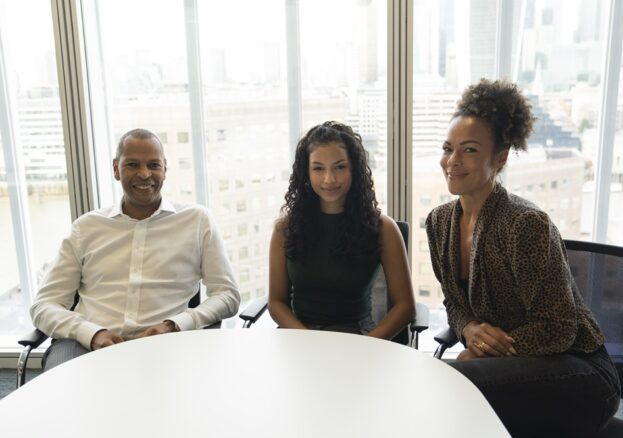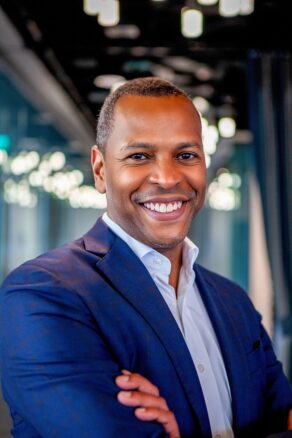
Dominic Carter, Executive Vice President of The Sun since 2022, sat down with Shelley Bishton, Head of Diversity, Equity & Inclusion for parent company News UK, for a conversation about building careers in media – where Black representation remains low – with apprentice Sun Showbiz journalist Lauryn Defreitas-Brady – hired in partnership with the MOBO Awards.

Lauryn: Hi both, so what inspired you to enter media?
Shelley: I grew up in Birmingham in the 80s and 90s, where Black civil rights were at the forefront of politics. My parents were activists, my mum has spent her life fighting for justice and equality for Black people. I vividly remember her petitioning for Black History Month to be put on the curriculum in school. So to be here now doing this article for Black History Month magazine feels like a full circle moment.
Dominic: I was in media sales and was told I’d never get a job in newspapers, back in the days it really was a case of who you knew. Most people suggested that I would never get a job in newspapers but that made me even more determined.
I just thought well I’m not paying attention to that. So, I wrote to all the newspapers and I got interviews at pretty much every newspaper on ‘Fleet Street’ at the time. I was offered a job on The Sun first. Since then I’ve worked across a lot of News UK brands – from The Times and The Sunday Times to talkSPORT and Virgin Radio UK. Then I was offered the opportunity to lead the newsbrand that really is part of the fabric of British society, The Sun, as a Black person at the head of that organisation. It was a very proud moment.
Lauryn: I grew up in a very multicultural environment as well. I’ve always been a storyteller and my biggest passion is to spotlight stories from the communities like the ones I grew up in.Over the span of your career, what are the key challenges you’ve faced?
Dominic: I spent the first nine years of my life growing up in Nigeria, where it’s very different. There I was considered as a caucasian because I’m mixed race and in the UK I’d get called something slightly different. I don’t need to tell you what I’d get called.
So when you spend your formative years in that sort of background you’re trying to establish how you fit in anyway. Then when you come into a workplace, you’re sort of immune to it. I haven’t felt there’s been any adversity or anything that’s blocked my career, I’ve seen it as an opportunity and I utilised my difference to create opportunities for myself. You have to move forward and I’ve always felt that responsibility, not just for me and my family, but for people who look like me, to show it can be done.
Lauryn: I think for me, just starting out on this journey, just to get your foot in the door is so difficult and it’s not talked about enough.You go through this mindset that you finish university or school and you’ll get a job that fits in with your degree, and everything’s going to work out the way you planned it.ut it takes time and ambition to get into spaces like this and I think being a person of colour there’s certainly that added amount of hardship.
Shelley: I think for most of my career I’ve usually been the only Black woman. And as I started to become more successful in my career, I certainly found I kept hitting ceilings and not knowing why. I do think being Black and a woman has different challenges. But I’m optimistic that things are getting better. And to work in a role which is focused on removing the obstacles and creating the pathways is amazing.
Lauryn: So what’s the best advice you’ve ever been given?
Shelley: So, I had the pleasure of interviewing Sir Trevor McDonald a couple of years ago and it was probably one of the most incredible moments of my life. He said to me: “You don’t need to know your final destination.” He talked about the fact he had no master plan at all, he just worked really hard at every opportunity he had and I just loved it because I just think we’re all so consumed with wanting to know what’s next and actually no one knows. So just really get stuck in and know that you’ve done everything you can because at least you can say you tried your best.
Lauryn: I agree. For me being told rejection is just redirection was a turning point. I think resilience is a trait that’s really important to have, especially in this environment.
Dominic: I think that’s a good one and that’s like saying they’re not barriers, they’re hurdles. They’re just things to get over. You’re going to have to work hard, you’re going to have to be prepared for the rejection because you’re going to get a lot of it and you just have to keep going – and in doing so, whether you’re conscious of it or not, you become a role model for others.
The Sun is a division of News UK, a media company at the heart of national conversation. Home to The Times, The Sunday Times, Virgin Radio UK, talkSPORT, and Times Radio, News UK reaches nearly 40 million people each month.
In November 2020, News UK launched its first diversity strategy, aiming for a 50/50 gender split and 20% ethnic minority representation at all levels. At the strategy launch, we were at 36% female representation and 9% ethnic minority. The proportion of women employed has since increased to 46%, and our ethnic minority representation is now 12%.
Our strategy aims to foster a more diverse News UK, making it future-fit, more innovative, and an attractive employer with new business opportunities.
We’ve launched 70 two-year apprenticeships and were the first media brand to partner with Kickstart, creating 52 paid internships for unemployed young people, many of whom transitioned to permanent roles at News UK. We’ve established partnerships with diversity recruitment specialists, developed leadership programmes for underrepresented groups, and integrated diversity experts across our brands. We are proud to be a Disability Confident Employer.
For more information on jobs check out newscareers.co.uk.
